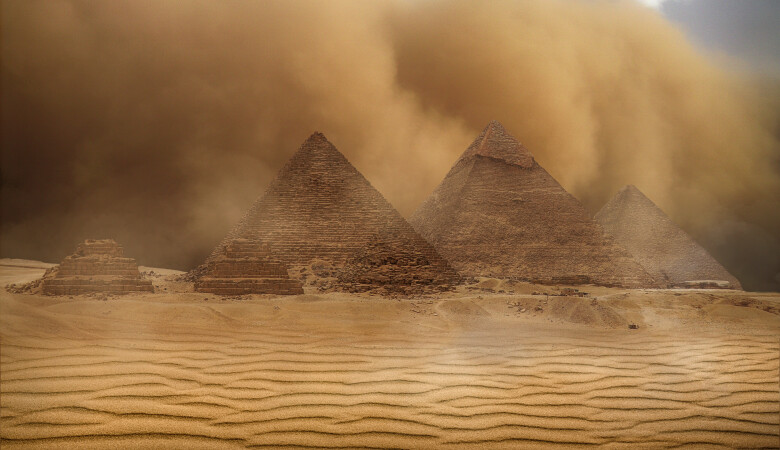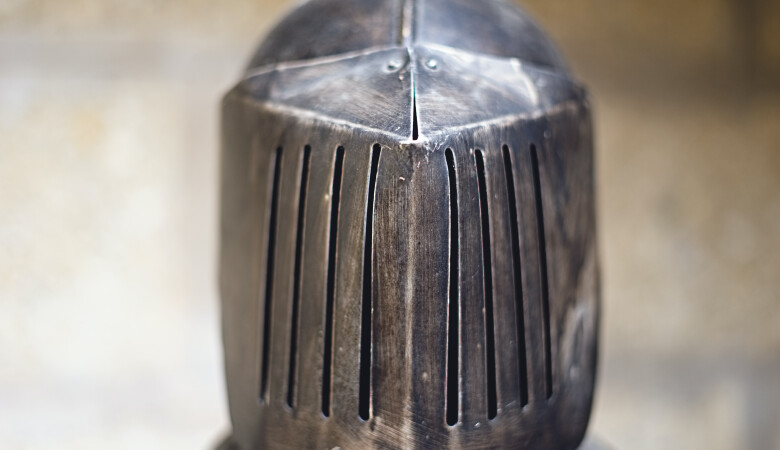The Raging of the Nations Quieted at Last (Isaiah Sermon 18 of 80)
September 14, 2008 | Andy Davis
Isaiah 17:1-14
Idolatry, Judgment, Providence and Sovereignty of God
Pastor Andy Davis preaches a verse-by-verse expository sermon on Isaiah 17:1-14. The main subject of the sermon is that the nations of the world rage against God's righteous rule.
- SERMON TRANSCRIPT -
I. Introduction
I believe it still ranks as one of the stupidest things that I’ve ever done (what a way to begin a sermon). I was on a summer evangelism project with a parachurch group in Hampton Beach, New Hampshire. A tropical storm had sat off the coast for a day or so, and it whipped the waves into a frenzy. The next day, right in the middle of the summer, there was no one on the beach. The beach wasn’t closed, but it didn’t need to be. Nobody in their right minds would swim in the ocean that day, except for me and a friend of mine. I had never seen the waves so high. I enjoyed body surfing, and it looked like Oahu. It was the closest I was ever going to get to those kinds of waves. So, the two of us went out and we started swimming and body surfing. What a time we had! We had a great time until we started to notice that we were getting further and further away from the shore. We were caught in a riptide, and we started getting scared. I said, kind of lightly, to my friend (his name was Chaz), “Don’t you think we oughta start heading in?” He said, “Good idea.” It took us 45 minutes just to get in. I’ll never forget that. We’d ride a wave about halfway in, and then swim as hard as we could just to maintain our position more or less in that place. Then we’d ride another wave halfway in. In this way, we dropped exhausted on the sand, glad to be alive. And I resolved never to swim again after a tropical storm or hurricane in the ocean, no matter how dramatic the waves.
There are times when we look at current event, and I think we as Christians can feel very much like that. We’re caught in a riptide. We have little or no control over where we’re going. Even death could face us, depending on the magnitude of the trial. We can feel very insecure in those situations. We like to have control and the fact is, that’s an illusion. We have very little control. And frankly, for the most part, since the church is made up of not many who are wise, not many who are influential, not many of noble birth, we have even less control than average people. We are not the king-makers of the world. I’m talking about the church as a whole, around the world. We are more passive when it comes to current events than even those great people of the world who think that they are in charge but really aren’t. But we know we’re not in charge. So we have to look, more than ever before, to the sovereign God who rules over history.
Look at this CNN age that we live in. That’s something that’s really just come on in the last few decades, where something negative, something significant, can happen anywhere in the world and we can know about it almost while it’s happening. I still remember during the first Gulf War, seeing Peter Arnett and some other CNN correspondents standing on the roof of the Al-Rashid Hotel in downtown Baghdad, while the bombing started, starting the war. This kind of gave you a ‘you are there’ feel, like we had never experienced before. CNN has continued since then, whether it’s a typhoon, a hurricane, an earthquake, a war, or something like that, you can be there and you can see it. I think it gives you a sense of the verses in Isaiah 17 that we’re going to look at today. Look at verses 12-13. It says, “Oh, the raging of many nations – they rage like the raging sea! Oh, the uproar of the peoples – they roar like the roaring of great waters! Although the people roar like the roar of surging waters, when he rebukes them they flee far away, driven before the wind like chaff on the hills, like tumbleweed before a gale.”
II. The Raging of the Nations Described (v 12)
Timeless Context: The Churning of Evil in the Heart
Those verses speak of the churning of the nations, the great power and convulsive effect of one nation after another, crashing into each other. Each of them is vying for supremacy in the world, for oil drilling rights, or for gold, or for control over a piece of property, something like that. It’s the surging, the raging of the nations. The church, the believers in Christ, are really like flotsam and jetsam, something floating on the surface that can do very little about it. Therefore, it’s good to know what this verse, this passage, and what we’ve seen in Isaiah teaches: God is sovereign over the nations, He sits on His throne and rules over all of these things. We can believe that there is nothing random happening on the face of the earth, that everything is for a purpose and that God is ruling over all things, though we don’t understand it, though we can’t know it. So we have the ragings of the nations described here, and I think the root cause, really, comes down to the heart of man. Because we are not at peace with God within our own hearts, we are not at peace with each other. Because of man’s original fall into sin, the world, the climate, the earth is at war with us and we with the earth. And so we’re in trouble because of sin.
It says in Isaiah 57:20-21, “The wicked are like the tossing sea, which cannot rest, whose waves cast up mire and mud. ‘There is no peace,’ says my God, ‘for the wicked.’” Since the year 2000, one website tells us that there have been one hundred and forty-two riots in the world. One hundred and forty-two riots. Many of us don’t know that in April of this year, there were riots in Haiti and Bangladesh and Mozambique over the spiraling cost of food. And what is just kind of an annoyance for us was desperate for them in terms of even getting enough to eat and survive, probably all of it tied to the rising cost of oil. There have been many other causes of riots over the years. There’s political unrest. Many of us can remember the demonstrations in Tiananmen Square in 1989 and what happened there as hundreds of thousands of Chinese crowded in, clamoring for political change. Race and racial tensions can be the cause of riots. In 1998, there were race riots in Jakarta, Indonesia between native Indonesians and ethnic Chinese. Religion can be a cause of riots. I think since 1979, when the hostages were taken by Iranian students, we’ve seen images of Muslim demonstrations almost every week, fists in the air and anger. So, religion can be a cause of it.
In 2007, in the town where the Taj Mahal is, there were angry mobs stirred up because there was an accidental death of an Islamic youth. There were riots between Hindus and Muslims. Anti-war demonstrations, food shortages, unemployment, housing shortages, grievances among prison inmates, gang violence, natural disasters leading to other physical problems and shortages, excessive pollution, and even sports can cause riots. There are soccer riots in Europe all of the time. It’s very nationalistic, but it goes on. Lots of violence, lots of anger, the seething rage of the nations. They rage like the roiling turbulent sea after a hurricane or tropical storm. It comes from the fact that we’re not at peace with God, and, therefore, we’re not at peace with each other. More potently, you see the rise and fall of the world, the rise and fall of one controlling regime after another, one empire after another, the invasion by one seething power of another country’s territory. “The raging of many nations – they rage like the raging sea; … they roar like the roaring of great waters.” (Is 17:12) They are like the relentless ocean, undulating and frothy, whipped by the eternal drives of sinful human nature, by what they want.
Satan’s Rage Imitated … and for the Same Reason
James 4:1-3 says, “What causes fights and quarrels among you? Don’t they come from your desires that battle within you? You want something but don’t get it. You kill and covet, but you cannot have what you want. You quarrel and fight. You do not have, because you do not ask God. When you do ask, you do not receive, because you ask with wrong motives, that you may spend what you get on your pleasures.” This is what’s whipping the nations into a frenzy. Behind it all is the rage of Satan. We’ve already learned this from Isaiah 14, of Satan’s fall and how Satan was ambitious, not content, not satisfied with what God has assigned to him. However great his personal beauty, and his personal wisdom, and his powerful position, it wasn’t enough for him. He was ambitious and covetous, and wanted to rise up. He gave us those five “I wills,” the ambitions of Satan. Satan rebelled against God and therefore God cast him down to the earth. He put him on a timetable for his ultimate destruction, as we saw. Revelation 12:12 says, “Woe to the earth and the sea, because the devil has gone down to you! He is filled with fury, because he knows that his time is short.”
When Adam, our federal head, our representative, ate the fruit of the forbidden tree, he, in effect, joined Satan in his rebellion against God. Therefore, he also, man, put a timetable on his ultimate destruction. We, as a race, are like Satan, filled with rage because we know our time is short. Hence, the uproar of the nations.
Ultimate Rage Directed at Christ: Psalm 2
The ultimate rage is directed toward God and toward His Christ. That’s where the real raging comes. Psalms 2:1 makes this plain, “Why do the nations rage and the people plot in vain?” The kings of the earth take their stand and the rulers gather together against the Lord and against his Anointed One, His Christ, His Messiah. “Let us break their chains asunder,” they say. “Throw off their fetters.” The One enthroned in heaven laughs. He laughs at it, but that’s where it is. It’s a hatred against God and against His rule, against Christ, and against His authority. That’s the nature of this raging that goes on.
Immediate Context: the Assyrian Invasion
Now, the immediate context here in Isaiah 17 is the Assyrian invasion, as we’ve seen. In the oracle of the nations here from chapter 13 of Isaiah up through 23, in the oracles of the nations, this Jewish prophet is describing political situations that would be alien to us. We wouldn’t care that much about them, perhaps. They happened a long time ago. They were resolved a long time ago. But there are two things you need to know about the Bible that make it immediately relevant and applicable. First of all, God never changes. He never changes. He’s the same yesterday, and today, and forever. What we can learn about God back in Isaiah’s time, twenty-seven centuries ago, is still true today. Now, He didn’t have to act in any given way. He can do whatever He chooses. I’m just saying He never changes. And if we can learn something about God’s character and His nature, His attributes, from something in the Bible, it’s still true today. Second of all, we don’t change either. I know we may wear different clothing, we may have advanced technology, but we have the same passions. We have the same lusts. We have the same drives and desires, the same thinking patterns. We’re the same.
III. Judgment on Damascus and Ephraim (vs 1-6)
First, Damascus Judged
Therefore, when we see how God interacts with sinners twenty-seven centuries ago, it should matter to us today. We should take it as a warning to flee the wrath to come. The judgment on Syria here, Damascus and Ephraim, is a judgment on peoples that may seem obsolete to us, but these facts are still with us, the facts that God never changes and that man never changes. Assyria was to invade Damascus, the Arameans, and also Ephraim. In Isaiah 17:1-6, it’s described. Look at verse 1, “An oracle concerning Damascus: ‘See, Damascus will no longer be a city but will become a heap of ruins.’” Damascus was the capital of Syria, not to be confused with Assyria. They were also known as the Arameans. It was a small nation, along with all those others: the Moabites and Edomites, and the northern and southern kingdoms of the Jews. These were the Syrians, and Damascus was their capital city.
Now, Damascus has the distinction, from what I’ve found, of being the longest continuously inhabited city on the face of the earth. People have been living there for centuries, for millennia. Rome is called “the Eternal City,” but Damascus, Syria was flourishing a couple of thousand years before Rome was founded in 753 BC. It was the capital of the Syrian nation in Isaiah’s day, also known as Aram. It was one of the most strategic cities in the ancient Near East. It stood at the mouth of a natural funnel through which ran the only convenient land route between Mesopotamia and Egypt. So everybody had to go down through Damascus. It positioned them very well for trade and for influence.
Remember back in Isaiah 7, when King Ahaz was terrified by an alliance between these two countries, Syria and Ephraim? Ephraim, the northern kingdom of the Jews, and Syria allied themselves against Judah. And you remember that Isaiah at that time predicted their destruction. Here is the second prediction. It says in verses 1-2, “See, Damascus will no longer be a city but will become a heap of ruins. The cities of Aroer will be deserted and left to flocks, which will lie down, with no one to make them afraid.”
Then, Ephraim Judged with Syria
But it wasn’t just the Arameans that were going to be judged. It was also the ten tribes of the Jews, Ephraim. Ephraim was the name of the Northern Kingdom of Israel. They were apostate right from the beginning of their history. Remember that Solomon was led into idolatry by his foreign wives, and God chose to judge him in the next generation through his son Rehoboam. And so the twelve tribes were split up. Ten tribes went to the Northern Kingdom under Jeroboam, son of Nebat. Right from the beginning, he led the Israelites, the Northern Kingdom, into sin because he did not want those ten tribes going three times a year back to Jerusalem, the City of David. He didn’t want them going there because he thought that he would lose his power and his influence. So he set up his own religion, with his own priests and his own idols, golden calves in Bethel and Dan. He immediately led those ten tribes into idolatrous worship. Pretty soon after that, they were worshipping in whatever way the nations worshipped around them. They became literally no different than any of the pagan peoples around them. A godless nation, those northern ten tribes.
They share in the destruction of the godless around them. Look at verse 3, “’The fortified city will disappear from Ephraim, and royal power from Damascus; the remnant of Aram will be like the glory of the Israelites,’ declares the Lord Almighty.” Verses 4-5 continue, “In that day the glory of Jacob will fade; the fat of his body will waste away. It will be as when a reaper gathers the standing grain and harvests the grain with his arms – as when a man gleans heads of grain in the Valley of Rephaim.” The picture here is of a formerly healthy man. Now he’s lost so much weight through illness, or perhaps like a prisoner of war. You come upon those that were in the Japanese concentration camps, or the Nazi concentration camps, with their skin barely hanging on their bones. They’re like living skeletons. That’s the image here, the fat of the body completely wasted away. That’s what the former health and prosperity of these two countries will be like.
End Result: Desolation (v 9)
And the end result in verse nine is desolation. “In that day their strong cities, which they left because of the Israelites, will be like places abandoned to thickets and undergrowth. And all will be desolation.”
How Will the Judgment Come?
How does this judgment come? It comes in the usual way. It comes through the invasion of the Assyrians. It’s what they do. The Assyrians coveted their land, and then they came. But we know what’s going to happen to the Assyrians, too. They’re going to be destroyed as well. So the nations, they rise, they fall, they come, they go, they covet, they invade, they win, they lose, all of it for earthly glory and earthly pleasure and earthly conquest, and none of it means anything eternally. All of them stand under the judgment of God, the real story of history, the real story of human beings’ relationship to Almighty God. That’s what causes everything. It’s because of that that we’re in the situations that we’re in now. The rise and fall of the nations is orchestrated because of that, because of human beings and their idolatry.
Yet … Still a Remnant for Israel
And yet, in the midst of all of that idolatry, look at verse six. Some gleanings will remain of Israel. This is a remnant for Israel that God promises. “’Some gleanings [of Israel] will remain, as when an olive tree is beaten, leaving two or three olives on the topmost branches, four or five on the fruitful boughs,’ declares the Lord, the God of Israel.” It says in Romans 11:29, “God’s gifts and His call are irrevocable.” And no matter how godless those ten tribes were, they were still descendants of Abraham, Isaac, and Jacob. He’s going to leave a remnant by His sovereign grace, though they don’t deserve it. Who does? Judah doesn’t deserve it either, none of us does. But by His sovereignty, He’s going to leave this handful of sick-looking olives that nobody wants. Physically, what that looked like was, after the Assyrian and Babylonian exiles, there were just some of the poorest in the land left to kind of farm it and be there. In Jeremiah 39:10, it says, “Nebuzaradan the commander of the guard left behind in the land of Judah some of the poor people, who owned nothing; and at that time he gave them vineyards and fields.” So God doesn’t totally give the Jews over to destruction, even though they are no better than their Gentile neighbors.
IV. The Root Cause of Judgment: Idolatry
Worshipping What you Do
Now, as I’ve mentioned, the root cause of this judgment is clear. It’s idolatry. Verse 8 mentions their altars, the work of their hands, the Asherah poles, and the incense altars that their fingers have made. The essence of idolatry is worshipping and serving created things rather than the Creator, who is forever praised, Amen. To worship what you do, to worship what you make with your hands, now that’s idolatry, to worship and serve created things. It is the ultimate foolishness to exchange the glory of the immortal God for images made to look like mortal man, and birds, and animals, and reptiles, and to worship, ultimately, man in all his glory, in all of his creative power.
Later on in this very book, Isaiah is going to lampoon idolatry with some of the most poignant sarcasm that you’ll find in any prophetic writing. Isiah 44:12 – 17 talks about the foolishness of crafting an idol and then falling down and worshipping it. This is what he says, “The blacksmith takes a tool and works with it in the coals; he shapes an idol with hammers, he forges it with the might of his arm. He gets hungry and loses his strength; he drinks no water and grows faint. The carpenter measures with a line and makes an outline with a marker; he roughs it out with chisels and marks it with compasses. He shapes it in the form of man, of man in all his glory, that it may dwell in a shrine. He cut down cedars, or perhaps took a cypress or oak. He let it grow among the trees of the forest, or planted a pine, and the rain made it grow. It is man’s fuel for burning; some of it he takes and warms himself, he kindles a fire and bakes bread. But he also fashions a god and worships it; he makes an idol and bows down to it. Half of the wood he burns in the fire; over it he prepares his meal, he roasts his meat and eats his fill. He also warms himself and says, ‘Ah! I am warm; I see the fire.’ From the rest he makes a god, his idol; he bows down to it and worships. He prays to it and says, ‘Save me; you are my god.’”
In the end, there are just two religions: the worship of the true living God and idolatry. For the longest time, even in my own ministry as a preacher, I underestimated the significance of the sin of idolatry. You read the Old Testament, and you think of totem poles and these odd-looking golden things and wooden things that people bow down to. But the fact of the matter is, if you’re not a genuine believer in the Lord Jesus Christ, in the living God through faith in Christ, you are an idolater. It’s a fact. That’s your religion. If you don’t have the true religion, you have idolatry. You’re worshipping and serving some created thing, maybe yourself. You could even be an atheist and you’re an idolater, worshipping yourself. We Americans, we struggle with our idolatries. Materialism is idolatry. Careerism is idolatry. Being in love with your achievements, your academic achievements or professional achievements, is idolatry. All of these things come close to home and it’s because of idolatry that God moves out in judgment.
Crafting a Religion Around Idols
These people crafted a system of religion that was handed down from generation to generation around their idolatry. It’s religious idolatry and you see elaborate systems of it in the east, in Hinduism and Buddhism and other types of idolatry. These people had Asherah poles, which represented the feminine side of deity. Goddesses were frequently worshipped along with the gods, usually through sexual immorality. They also had altars that their hands had made. They offered sacrifices to demon gods. They’re not true gods, they’re demon gods who do God impersonations. And these people bow down to that.
But the Whole System is Empty
The whole system, however, is empty. When the judgment comes, when the Assyrians come over the border, they forsake the idols and run for their lives. They say, “Save me, you are my god.” But their god can’t save them because he doesn’t exist. And in that day they will forsake it. They will run for their lives. They will turn away from the idols that they made and run away from them because they know that they cannot save.
Deepest Issue: Rejecting God (v 10)
But the deepest issue is rejecting God. Look at verse 10, “You have forgotten God your Savior; you have not remembered the Rock, your fortress.” Exchanging the glory of the immortal God for images, that’s exactly what they did. It’s especially tragic for those ten tribes, the northern tribes of Israel. Think of all that God had done through Moses and Aaron, how He rescued them from the land of slavery by the ten plagues that He demonstrated with a mighty hand and outstretched arm, and how He led them through the Red Sea when the water walled up to the right and to the left and they passed right through. Two million strong, right through by the power of God. They went through to the other side and there God provided water out of a rock, and manna came down. They just picked it up off the ground. God delivered them for forty years in the desert and carried them as a father carries his son on his shoulders. He brought them right across the Jordan River at flood stage when the water heaped up like a mountain, and they crossed on dry ground. They surrounded the walls of Jericho, that mighty walled city, and then they just cried out on the seventh day and the walls came falling down. They took over the whole promised land by miraculous power, taking over nations more powerful than they were.
In this way, they came into a land flowing with milk and honey, and they ate from vineyards they didn’t plant, and they lived in houses they didn’t build. All of this done by the hand of God. And it wasn’t long after that, that they turned away, those ten tribes, from the God of their heritage, the God of their fathers, of Abraham, Isaac, and Jacob, and worshipped and served foreign gods. It says in Jeremiah 2:11 that this is the greatest tragedy of all time. “’Has a nation ever changed its gods? (Yet they are not gods at all.) But my people have exchanged their glory for worthless idols. Be appalled at this, O heavens, and shudder with great horror,’ declares the Lord. ‘My people have committed two sins: they have forsaken Me, the spring of living water, and have dug their own cisterns, broken cisterns that cannot hold water.’”
Result: A Harvest of Incurable Pain
The result of this idolatry, of this exchange, is a harvest of incurable pain. God puts a curse on everything they do. Everything they do, there’s a curse on the work of their hands. Look at verses 10-11, “You have forgotten God your Savior; you have not remembered the Rock, your fortress. Therefore, though you set out the finest plants and plant imported vines, though on the day you set them out, you make them grow, and on the morning when you plant them, you bring them to bud, yet the harvest will be as nothing in the day of disease and incurable pain.” What a dreadful, final end! What a terrifying thing it is to have Almighty God as your enemy, to have God fighting everything you do, to have Him not bless you when you sit at home and when you walk along the road, and when you rise and lie down, to have God not bless your kneading trough, and your calves, and all the agricultural images.
You say, “We’re not farmers. Or, what do these vines have to do with us?” Well, alright, translate it then into the 21st century. You invest in a small business and it goes belly-up. You leave one job and go to another thinking things are going to go better for you and they go much worse. You have problems with material possessions. You have a flood in your home, or you have repairs to your car that you can’t afford, one thing after another. How can you fight God? Could it be that God is using all of these adverse circumstances to say, “Look, this is happening to you?” You may not have thought Isaiah 17 was relevant to you, but you set out vines and you planted them thinking good things were going to come. And nothing comes of it. Could it be you’re out of fellowship with God? That God himself is fighting you?
Now, it mentions the day of disease and incurable pain. It is true that we can suffer in this world. We can have pain in this world. We can have incurable diseases. We think of AIDS as an incurable disease. You could bye laying there suffering from AIDS and wonder, “Is this a judgment of God on me?” Frankly, any disease that takes you out of the world was, in the end, incurable, wasn’t it? The doctor couldn’t cure it. He couldn’t save you from dying, and so you died. But I don’t think that’s the ultimate judgment of God, do you? “Do not be afraid,” said Jesus, “of those who kill the body and after that, there’s nothing more they can do. But be afraid of the one who has power to destroy both soul and body in hell.” Death isn’t the end. God has appointed for each one of us that we die and then face judgment day, in which we give an account for the things done in the body. So to me, the real day of disease and incurable pain is hell. It’s a day that will last forever. It is incurable because God will not cure it and any He casts to hell are cast there forever. There is no rescue. There is no refuge. That is the ultimate end of idolatry, it’s the ultimate end, the ultimate judgment of God that He will bring.
V. The Effect of the Judgment: Genuine Faith in God
A Ray of Hope: Judgment Brings Repentance
God in His mercy, God in His kindness gives us samples of that future judgment while there’s still time to repent. You may not think of it as mercy, but we should think of it that way. When judgment comes on other people, like the Tower of Siloam fell and some people died, Jesus said that unless we repent we will all likewise perish. Hurricane Ike didn’t come our way. Well, we’re fine then. We have our power, we have our electricity. You’re not thinking rightly. When you turn on CNN and you see some misery for other people in another part of the world, you should say, “Unless we repent, we will all likewise perish.” That’s one message. Another is, “There but by the grace of God, go I.” What can I do with the grace that God’s given me to help them and reach out to them and love them? If you come to Isaiah 7 and say, “This is the Syrians and the Ephraimites, what do they have to do with me? Oh, they lived twenty-seven centuries ago,” you’re missing the point. God is still holy and we’re still idolaters. He hasn’t changed. And unless we repent, we will all likewise perish.
The ray of hope in the middle of this is that God can bring about salvation for sinners like you and me. Isn’t that sweet? Isn’t that magnificent? Look what it says in verses 7-8, “In that day men will look to their Maker and turn their eyes to the Holy One of Israel.” At last they look to him! “They will not look to the altars, the work of their hands, and they will have no regard for the Asherah poles and the incense altars their fingers have made.” They finally turn to the Lord and look to Him.
Israel Finally Looks to God
It says in Isaiah 4:22, “Look unto me, and be saved, all you ends of the earth.” It’s the look of faith. CNN’s not going to cover the look of faith, friends. But it’s going on all over the world, praise God! People from every tribe, and language, and people, and nation are hearing the gospel and they’re looking, at last, away from the work of their hands. They’re looking up to their Maker and they’re finding salvation in Him through His Son, Jesus Christ.
Looking to Christ Before the Final Judgment Comes
I think it’s my primary job, as a preacher, to make Christ crucified almost visible to your eyes. I think about that hymn, “Before the Throne of God.” At the end, it says, “Behold him there, the risen lamb, the perfect spotless, the great I Am.” Behold Him there. How do you see Him? By faith. It says in Galatians 3:1, “Before your very eyes Jesus Christ was portrayed as crucified.” The Apostle Paul says to the Corinthians, in 1 Corinthians 2:2, “I resolved to know nothing while I was with you except Jesus Christ and him crucified.” So behold Him there, the bloody Son of God who shed His blood for idolaters, for sinners like you and me. And in that day, it says they will have no more regard for the work of their hands. They’re going to look to their Maker, their Creator, their sustainer, and to their Savior, and they will find in Him salvation. Look to Him. Look to Him.
VI. The Raging of the Nations: Quieted at Last (vs 12-14)
This is an assembly of Christian worship. Most of you who come in here with a profession of faith in Christ, are you done looking to Jesus? Are you finished being saved? Look unto Him and be saved. Keep looking. Look unto Him the rest of your life. Realize that there are still idolatries inside our divided hearts. Romans 7 talks about it, ‘The very thing we hate, we do.” Why? Because there are idols still there and we still bow the knee and give them allegiance. Look unto Him and be saved, all the ends of the earth. In this alone will the raging of the nations be quieted at last. This is where the peace comes from. It’s not coming from the United Nations. It’s not coming from military actions. It’s not coming from economic sanctions. It’s not coming from a new invention. It’s not coming from better food distribution systems. It’s not coming from the best negotiator that ever lived. None of that is going to bring peace between the nations. Not at all.
You want to know what’s going to bring peace between the nations? The actions of our Sovereign God, actions in judgment and actions in salvation. We’ve talked about the judgment. He’s going to clean it all up. He’s going to come back in glorious power and He’s going to destroy the final regime, the final nation, that one world nation under the antichrist. And the dragon, the devil, stands by the sea, remember? And up out of the sea comes the beast. What does the sea represent? The raging sea, it’s right here in Isaiah 17. It’s the nations, the turbulent nations. Up out of the nations comes the antichrist. It’s the same image in Daniel 7. He has a dream and the winds are blowing over the turbulent sea and up out of it comes four beasts, one after the other. Up out of the sea comes the nations, the final form of that, the antichrist, doing the bidding of the dragon, of Satan. Up he comes.
The nations will still be raging, still be turbulent until the Lord Jesus comes back in all His glory, amen? He destroys the antichrist and destroys the devil, and gets rid of the sea. It says in Revelation 21:1, “Then I saw a new heaven and a new earth, for the first heaven and first earth had passed away, and there was no longer any sea.” I really link that right back to Isaiah 17:12. The turbulent, crashing waves of rebellion against Almighty God is over and there’s going to be this quiet, peaceful, loving group of people from every tribe and language and people and nation who are all focused on the throne of Christ. He will reign forever and ever over a peaceful multitude. The time of rebellion will end and your heart will be at peace with God and with one another. Why? Because it says in Romans 5:1, “Therefore, since we have been justified through faith,” What do we have? ”we have peace with God through our Lord Jesus Christ.”
As a result of that, we have peace with one another. Why? Because Jesus Christ paid our price for us. Isaiah 53:5 says, “He was pierced for our transgressions, He was crushed for our iniquities; the punishment that brought us peace was upon him, and by his wounds we are healed.” The punishment that brought us what? Peace. That’s where it’s going to happen, friends. That’s where the raging turbulence of the nations will end at last, at the end of the world when Jesus comes and establishes His throne. Then it will be true, what it says in Zechariah 1:11, “we have gone throughout the earth and found the whole world at rest and in peace.” Oh, how sweet will that be!
So there are two looks. We’ll see Christ in two different ways. The first is the look of faith. That can happen right now. Close your physical eyes. If you look with your mind’s eye, then you can see Christ crucified. You can also see Christ resurrected. You can see Christ reigning on the throne. You can see Christ returning in glory. Alright, it’s the look of faith. You can see Him that way or you can wait and you can see Him with your eyes. “Behold, He is coming with the clouds, and every eye will see him, even those who pierced him; and all the peoples of the earth will mourn because of him. So shall it be! Amen.” Revelation 1:7. You’ll see Him either way. I urge you to see Him now, see Him today by faith so that all your sins can be forgiven. Close with me in prayer.































